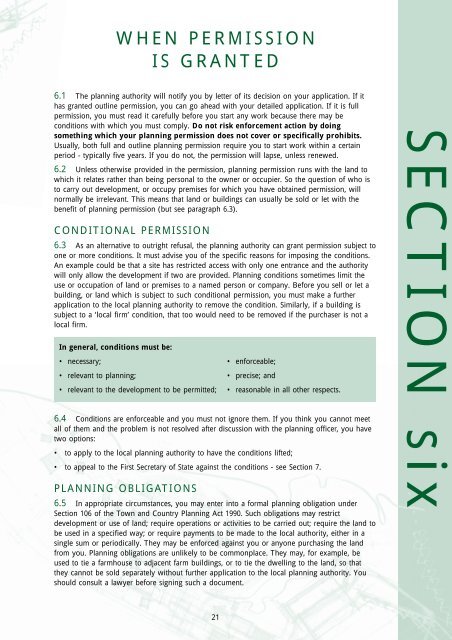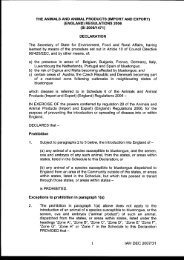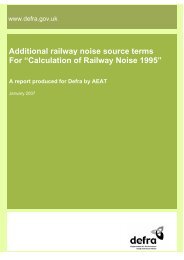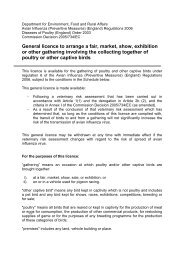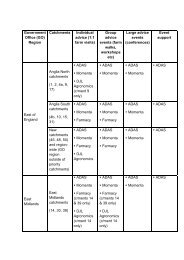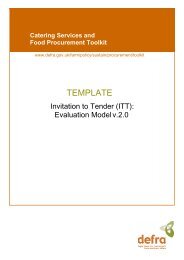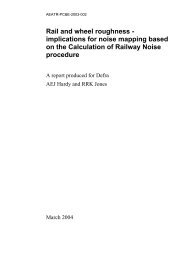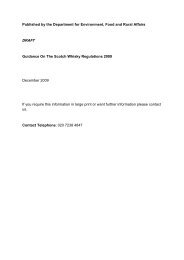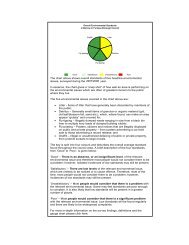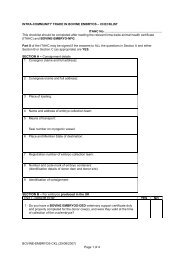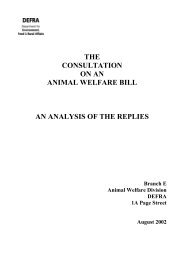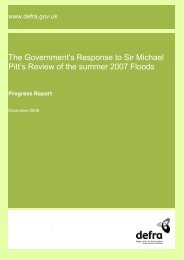A Farmer's Guide to the Planning System - ARCHIVE: Defra
A Farmer's Guide to the Planning System - ARCHIVE: Defra
A Farmer's Guide to the Planning System - ARCHIVE: Defra
You also want an ePaper? Increase the reach of your titles
YUMPU automatically turns print PDFs into web optimized ePapers that Google loves.
WHEN PERMISSION<br />
IS GRANTED<br />
6.1 The planning authority will notify you by letter of its decision on your application. If it<br />
has granted outline permission, you can go ahead with your detailed application. If it is full<br />
permission, you must read it carefully before you start any work because <strong>the</strong>re may be<br />
conditions with which you must comply. Do not risk enforcement action by doing<br />
something which your planning permission does not cover or specifically prohibits.<br />
Usually, both full and outline planning permission require you <strong>to</strong> start work within a certain<br />
period - typically five years. If you do not, <strong>the</strong> permission will lapse, unless renewed.<br />
6.2 Unless o<strong>the</strong>rwise provided in <strong>the</strong> permission, planning permission runs with <strong>the</strong> land <strong>to</strong><br />
which it relates ra<strong>the</strong>r than being personal <strong>to</strong> <strong>the</strong> owner or occupier. So <strong>the</strong> question of who is<br />
<strong>to</strong> carry out development, or occupy premises for which you have obtained permission, will<br />
normally be irrelevant. This means that land or buildings can usually be sold or let with <strong>the</strong><br />
benefit of planning permission (but see paragraph 6.3).<br />
CONDITIONAL PERMISSION<br />
6.3 As an alternative <strong>to</strong> outright refusal, <strong>the</strong> planning authority can grant permission subject <strong>to</strong><br />
one or more conditions. It must advise you of <strong>the</strong> specific reasons for imposing <strong>the</strong> conditions.<br />
An example could be that a site has restricted access with only one entrance and <strong>the</strong> authority<br />
will only allow <strong>the</strong> development if two are provided. <strong>Planning</strong> conditions sometimes limit <strong>the</strong><br />
use or occupation of land or premises <strong>to</strong> a named person or company. Before you sell or let a<br />
building, or land which is subject <strong>to</strong> such conditional permission, you must make a fur<strong>the</strong>r<br />
application <strong>to</strong> <strong>the</strong> local planning authority <strong>to</strong> remove <strong>the</strong> condition. Similarly, if a building is<br />
subject <strong>to</strong> a ‘local firm’ condition, that <strong>to</strong>o would need <strong>to</strong> be removed if <strong>the</strong> purchaser is not a<br />
local firm.<br />
In general, conditions must be:<br />
• necessary; • enforceable;<br />
• relevant <strong>to</strong> planning; • precise; and<br />
• relevant <strong>to</strong> <strong>the</strong> development <strong>to</strong> be permitted; • reasonable in all o<strong>the</strong>r respects.<br />
6.4 Conditions are enforceable and you must not ignore <strong>the</strong>m. If you think you cannot meet<br />
all of <strong>the</strong>m and <strong>the</strong> problem is not resolved after discussion with <strong>the</strong> planning officer, you have<br />
two options:<br />
• <strong>to</strong> apply <strong>to</strong> <strong>the</strong> local planning authority <strong>to</strong> have <strong>the</strong> conditions lifted;<br />
• <strong>to</strong> appeal <strong>to</strong> <strong>the</strong> First Secretary of State against <strong>the</strong> conditions - see Section 7.<br />
PLANNING OBLIGATIONS<br />
6.5 In appropriate circumstances, you may enter in<strong>to</strong> a formal planning obligation under<br />
Section 106 of <strong>the</strong> Town and Country <strong>Planning</strong> Act 1990. Such obligations may restrict<br />
development or use of land; require operations or activities <strong>to</strong> be carried out; require <strong>the</strong> land <strong>to</strong><br />
be used in a specified way; or require payments <strong>to</strong> be made <strong>to</strong> <strong>the</strong> local authority, ei<strong>the</strong>r in a<br />
single sum or periodically. They may be enforced against you or anyone purchasing <strong>the</strong> land<br />
from you. <strong>Planning</strong> obligations are unlikely <strong>to</strong> be commonplace. They may, for example, be<br />
used <strong>to</strong> tie a farmhouse <strong>to</strong> adjacent farm buildings, or <strong>to</strong> tie <strong>the</strong> dwelling <strong>to</strong> <strong>the</strong> land, so that<br />
<strong>the</strong>y cannot be sold separately without fur<strong>the</strong>r application <strong>to</strong> <strong>the</strong> local planning authority. You<br />
should consult a lawyer before signing such a document.<br />
21<br />
SECTION six


